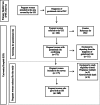Inadequacy of gestational weight gain during high-risk pregnancies is not associated with household food insecurity
- PMID: 34187424
- PMCID: PMC8243526
- DOI: 10.1186/s12884-021-03950-y
Inadequacy of gestational weight gain during high-risk pregnancies is not associated with household food insecurity
Abstract
Background: Inadequate gestational weight gain (GWG) is associated with adverse outcomes in maternal and child health and can be enhanced by social inequalities, such as lower education and household food insecurity (HFI). Women are more vulnerable to HFI, which has been associated with negative health effects for pregnant women during the prenatal and puerperal periods, particularly in regard to the aggravation of pregnancy risks. This study investigated the association between sociodemographic characteristics and HFI with respect to adequacy of total GWG among women with high-risk pregnancies.
Methods: This was a prospective cohort study that evaluated the total GWG of 169 pregnant women. The women were seen at a public university hospital in the metropolitan region of Rio de Janeiro (Brazil). Their sociodemographic and gestational characteristics and the Brazilian Scale of Domestic Food Insecurity were investigated. To estimate the total GWG, the difference between the patient weight at the last prenatal visit and the initial patient weight was verified, with both collected from the medical records of the pregnant women. The classification of the total GWG considered the recommendations of the Institute of Medicine (IOM) (2009). A multinomial logistic regression model assessed the risk (odds ratio; OR) and confidence intervals (CI 95%)) of insufficient and excessive GWG with exposure to HFI and other covariates (p value <0.05).
Results: Insufficient and excessive GWG were observed in 27.8% and 47.9% of the pregnant women, respectively. More than half of the women (74.6%) had a high education level. Exposure to mild HFI occurred in 44.2% of the women. After adjustment, the HFI was not associated with insufficient or excessive GWG. The educational level of women was the only variable significantly associated with a lower risk of GWG insufficiency (OR: 0.10; 95% CI: 0.01-0.89).
Conclusions: In this population, higher maternal education was a protective factor against insufficient GWG. We highlight the importance of additional health support and counseling for women in the most vulnerable social conditions, considering the importance of access to information for reducing health risks.
Keywords: Food and nutrition security; Gestational weight gain; Pregnant women; Social determinants of health.
Conflict of interest statement
The authors declare that they have no competing interests.
Figures
References
-
- Santos S, Voerman E, Amiano P, Barros H, Beilin LJ, Bergstrom A, et al. Impact of maternal body mass index and gestational weight gain on pregnancy complications: na individual participant dat meta-analysis of Europan, North American and Australian cohorts. BJOG. 2019. 10.1111/1471-0528.15661. - PMC - PubMed
-
- Zhao R, Xu I, Wu MI, Huang SH, Cao XJ. Maternal pre-pregnancy body mass index, gestational weight gain influence birth weight. Women Brith. 2017. 10.1016/j.wombi.2017.06.003. - PubMed
MeSH terms
LinkOut - more resources
Full Text Sources
Medical


